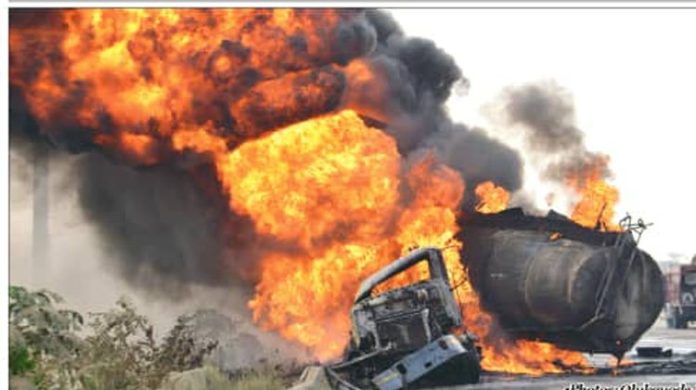BARELY two weeks after the Agbor tanker fire, the nation was once again been plunged into mourning following the latest tragedy in Niger State. The Niger tanker fire explosion claimed over 80 lives at the weekend, with another 52 individuals suffering varying degrees of injuries after attempting to scoop fuel from the fallen tanker. This grim incident echoes the Agbor tragedy, which, though less devastating, still resulted in the loss of four lives and the destruction of properties. These successive calamities underline a disturbing trend that has plagued Nigeria for decades, as tanker explosions continue to devastate communities, inflict untold sorrow, and expose glaring lapses in road and fuel transportation safety.
Nigeria, Africa’s largest oil producer, has witnessed an alarming frequency of tanker fire disasters that have claimed dozens of lives in recent years. In October 2024, more than 150 people were killed in Jigawa State following a similar incident. Just a month earlier, another 59 people perished in Niger State when a fuel tanker collided with a truck carrying passengers and cattle. These tragedies reveal a pattern of negligence, indiscipline, and infrastructural deficiencies that endanger lives and livelihoods across the country.
In the Niger explosion, as with many similar incidents, the tragic loss of life was compounded by the dangerous behaviour of residents who rushed to scoop fuel from the fallen tanker. This behaviour, often driven by desperation and economic hardship, transforms potential accidents into large-scale disasters. While education campaigns have been launched in the past to discourage such actions, the recurrence of these tragedies suggests that these efforts are insufficient. A multi-pronged approach involving sustained public enlightenment, stronger law enforcement, and improved socioeconomic conditions is critical to dissuading people from risking their lives in such perilous circumstances.
The Agbor tanker explosion, though less severe in terms of casualties, is another poignant reminder of the dire need for proactive measures. Commendably, the state government has pledged to assist the victims in rebuilding their lives. However, beyond post-incident relief, there is an urgent need for preventive measures to forestall future occurrences. The government must prioritise the implementation of stricter safety protocols for fuel transportation, including ensuring that tankers meet minimum roadworthiness standards and that drivers are adequately trained and monitored. The importance of periodic vehicle inspections cannot be overstated, as poorly maintained tankers are a ticking time bomb on Nigeria’s roads. Tanker drivers must be held accountable for reckless behaviour, and companies that fail to maintain their vehicles should face substantial penalties. Agencies tasked with overseeing the oil and gas sector, such as Nigeria Union of Petroleum and Natural Gas Workers (NUPENG), which the Petroleum Tanker Drivers fall under must be empowered and resourced to carry out their mandates effectively.
The role of disaster management agencies, particularly the fire service, is equally crucial in mitigating the impact of tanker fire incidents. The Agbor explosion revealed the need for a more proactive and better-equipped response system. Frequent training for fire service personnel, alongside the provision of modern firefighting equipment, should be treated as a matter of national urgency.
While the devastation caused by these incidents is heart-wrenching, they also highlight broader systemic issues that require comprehensive government action. The transportation of fuel across vast distances on poorly maintained roads by ageing tankers is a recipe for disaster. A long-term solution lies in reducing the reliance on road transport for fuel distribution by revitalising Nigeria’s rail network and pipelines. These modes of transport are safer, more cost-effective, and environmentally friendly.
While we remain deeply sympathetic to the victims and survivors of these incidents, the government’s commitment to addressing the root causes of these tragedies must be clear. The Niger and Agbor tanker fires are stark reminders of the human cost of inaction. Nigeria cannot afford to normalise such tragedies.


